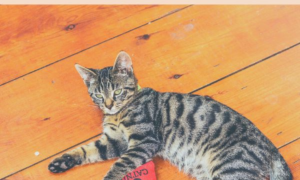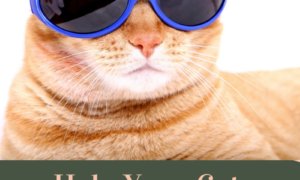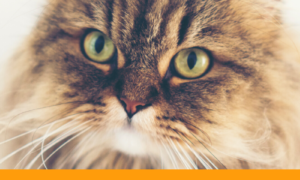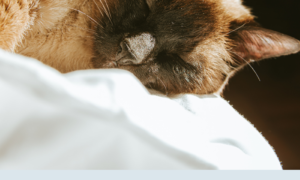By Darcy Lockman for The Daily Cat
When Cleveland, Ohio cat owner Ingrid Danziger’s mom was diagnosed with Type II diabetes, Danziger became worried not only about her mother, but also about her cat. “Like my mom, Sam was really overweight. I couldn’t go back and rewrite my mother’s history, but I could try to do something about Sam’s size before it was too late,” said 38-year-old Danziger.
Sam’s veterinarian recommended cutting portion size and also feeding a commercial food containing L-carnitine, which is thought to alter metabolism. Studies suggest it reduces body fat while increasing muscle mass. “It’s an uphill battle,” acknowledges Danziger. “But my efforts are starting to make a difference.”
Below, Dr. Sally Perea, veterinary nutritionist and professor at the University of California, Davis, weighs in on other nutritional choices that can help prevent common cat health issues.
The Issue: Immune System Function
Maintaining cat health starts by enhancing the ability to fight off illness in the first place. “Proper nutrition is important for proper immune function, so nearly all of the essential nutrients for cats are important for maintaining it,” says Dr. Perea. “That means protein, amino acids, essential fatty acids and essential vitamins and minerals. Copper, zinc and iron are three essential minerals in the diet that are known to be important for proper antibody and enzymatic defense mechanisms.”
To ensure your cat is getting all it needs, Dr. Perea recommends a commercial cat food that has “complete and balanced” somewhere on the packaging. A seal of approval from the Association of American Feed Control Officials (AAFCO), the group that regulates the pet food industry, will verify the food’s claim.
The Issue: Skin and Coat Health
Just like you, your cat can have a bad hair and skin day, with flakiness, dryness and more. To combat the underlying problems, make sure your cat’s diet contains essential fatty acids. These are the omega-3 and omega-6 fats found in sources like chicken, fish oil and eggs. They work to maintain the water barrier function of the skin, similar to how moisturizer can create a protective barrier on human skin.
According to Dr. Perea, foods that are good for skin and hair are the ones that contain the mineral zinc, as well as A, E and B vitamins. “Zinc is integral to rapidly dividing cells, like skin cells, while vitamin E takes on an antioxidant role in the body’s cell membranes,” she explains. “Vitamin A and B prevent hair loss and scaling skin.”
The Issue: Joints and Mobility
To maintain overall cat health, exercise is needed, and to maintain an active lifestyle, cats need to be pain-free. To prevent joint and mobility issues, Dr. Perea recommends a food containing glucosamine, chondroitin sulfate and that seemingly magical elixir: fish oil.
“There hasn’t been a lot of research on any of these in cats, but chondroitin sulfate and glucosamine, as well as long chain omega-3 polyunsaturated fatty acids, such as those found in fish oils, have been shown to help improve signs associated with osteoarthritis in dogs,” says Dr. Perea. “These have become popular and are possibly beneficial for cats as well.”
The Issue: Overall Body Condition
As with immune system maintenance, overall body maintenance relies upon a complete and balanced diet containing all of the animal’s essential amino acids, vitamins and minerals. But make sure not to give your pet too much of a good thing. “Lean body condition is important to overall health, so make sure to feed appropriate portions,” says Dr. Perea. “Obesity is a growing problem in cats, and it can be very difficult to implement weight loss once they become obese. Prevention is very important.”
Measure your cat’s food on a daily basis using the guidelines on the packaging. Consider feeding a diet that contains L-carnitine, the ingredient recommended for Ingrid Danziger’s cat. Be especially careful about weight gain after your pet has been spayed or neutered. Studies have shown that fixed cats are more prone to weight gain due to a decrease in physical activity.
The Issue: Digestive Disorders
If your cat has an upset stomach, a relatively empty litter box may be your first clue. Cats often suffer constipation, which can be relieved by foods containing carbohydrates as well as fiber. “Fiber helps with the health of the large intestine,” says Dr. Perea. She emphatically adds, “They also need enough water!” Make sure to fill your feline’s bowl with clean, fresh water. Change it at least twice, or even more often as needed.
The Issue: Oral Health
A dry food diet with a relatively larger kibble size forces your pet to really bite down on each individual piece. “This achieves a mechanical brushing action against the surface of the tooth,” explains Dr. Perea. “Other foods on the market may incorporate a calcium-chelating agent on the surface of the kibble. This binds calcium and helps prevent tartar formation.” In order to provide your cat with such a food, look for a diet that claims to promote oral health. The claims should again be verified by an AAFCO seal.
Protecting your cat’s well-being is as easy as a trip down the pet food aisle. Armed with a little bit of knowledge about your feline’s basic needs, you can stave off the most common cat conditions. Your cat will reward you with the pleasure of its company for years to come.
Darcy Lockman is a Brooklyn, N.Y.-based freelance writer and frequent contributor to The Daily Cat. Her work has appeared in publications such as the New York Times and Rolling Stone.






